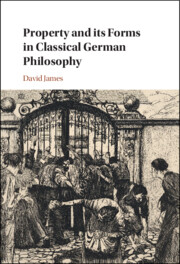Book contents
- Property and Its Forms in Classical German Philosophy
- Property and Its Forms in Classical German Philosophy
- Copyright page
- Contents
- Acknowledgements
- Abbreviations
- Introduction
- Chapter 1 Property, Freedom and Enlightenment
- Chapter 2 Fichte on Property and Labour
- Chapter 3 Property and Ethical Life
- Chapter 4 Equality, Exchange Value and Individuality
- Concluding Remark
- Bibliography
- Index
Chapter 2 - Fichte on Property and Labour
Published online by Cambridge University Press: 22 December 2022
- Property and Its Forms in Classical German Philosophy
- Property and Its Forms in Classical German Philosophy
- Copyright page
- Contents
- Acknowledgements
- Abbreviations
- Introduction
- Chapter 1 Property, Freedom and Enlightenment
- Chapter 2 Fichte on Property and Labour
- Chapter 3 Property and Ethical Life
- Chapter 4 Equality, Exchange Value and Individuality
- Concluding Remark
- Bibliography
- Index
Summary
This chapter begins with Fichte’s early theory of property as presented in his defence of the French Revolution from 1793. My intention is to show how tensions within this theory of property can be explained in terms of an unsuccessful attempt to establish a necessary connection between the right to property and labour. In the later Foundations of Natural Right, Fichte’s attempt to explain the connection between the right to property and labour leads him to reject his earlier dyadic (person–thing) model of the concept of property. A triadic (person–thing–person) model is instead shown to follow from Fichte’s understanding of the concept of right and the role of recognition in his theory of right. The connection between the right to property and labour is explained in terms of how each person’s property rights must enable him or her to live from his or her labour. This will be shown to demand forms of property other than private property in relation to certain activities and the resources required by them. Fichte nevertheless speaks of ‘absolute property’ and thereby suggests the possibility of some role for private property within the rational state.
- Type
- Chapter
- Information
- Property and its Forms in Classical German Philosophy , pp. 48 - 88Publisher: Cambridge University PressPrint publication year: 2023

